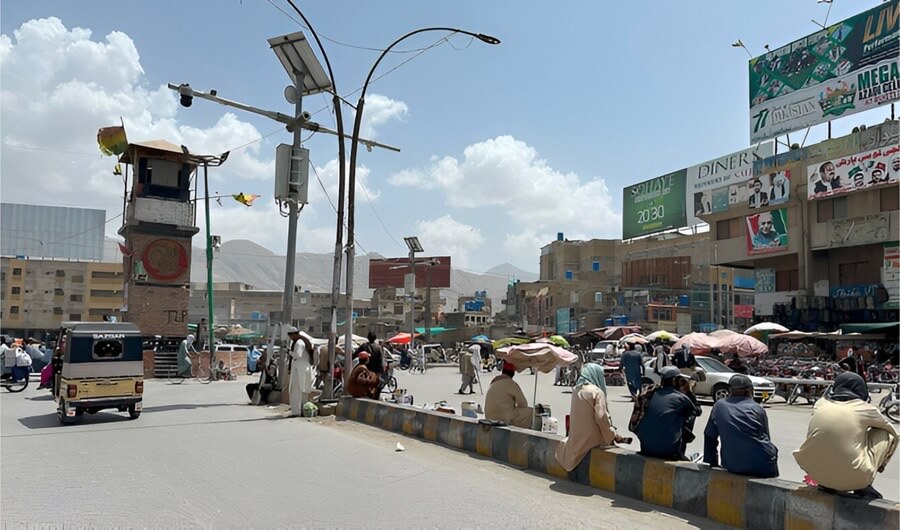By Fakeha Laique
Balochistan is Pakistan’s largest province, but paradoxically remains one of the most underdeveloped. Despite having rich natural resources, a geostrategic location, at the center of regional prosperity, Balochistan is still home to poor development, security, and governance problems.

The recently held National Seminar at the Balochistan Think Tank Network (BTTN) in Quetta, titled “Balochistan: Initiatives for its Development and Security – Challenges and Way Forward,” invited experts, together with civil society members, to discuss ongoing dilemmas and practical solutions. The key takeaway from the seminar was that the fate of Balochistan will depend on political commitment and extensive dialogue, as well as basic shifts in both systems of government and development strategies.
Balochistan borders Afghanistan and Iran and has the shortest way to the Arabian Sea via the Gwadar Port. This makes it a geostrategic cornerstone of regional connectivity projects, especially the China-Pakistan Economic Corridor (CPEC). However, while they should harness economic growth, the people of Balochistan have to deal with an unstable environment that is a result of the competing interests of regional powers as well as poor internal governance. As highlighted during the seminar, bad governance remains the province’s Achilles’ heel.
Today, many argue that Balochistan’s strategic value stands abandoned, as it has become a theater for external manipulation and internal discontent. The common perception is that successive governments have failed to translate the province’s potential into actual progress. Despite receiving significant financing from the National Finance Commission (NFC) Award, the province’s funds, due to bad governance, are underutilized and undermined. It is because of these reasons that the masses are often exploited, against the socio-economic uplift of Balochistan.
The seminar addressed a sobering reality, analyzing the districts with the worst human deprivation indices in the province, given that around 16 districts continue to be underdeveloped. Examining Balochistan’s issues through ethnic perspectives obscures the basic structural problems that persist in the province. The region suffers from weak institutions as well as inefficient public service delivery systems and insufficient accountability mechanisms.
True change demands both institutional improvement and reliable performance evaluation systems. The speakers stated that public representatives should provide 5-year performance reports alongside key performance indicators to allow citizens to monitor their accountability. The act of governance requires serving the people instead of being extractive. Political representatives, especially those from local and ethnic backgrounds, need to act beyond symbolic representation and start delivering results. Encouraging the youth to question their elected leaders is a step toward strengthening civic responsibility and democratic culture.
Security in Balochistan is typically discussed from a military perspective, yet the seminar presented an alternative framework: dialogue. Youth alienation across Balochistan gives extremist groups incentives to exploit the situation. An effective solution demands political participation of youth through policy inclusion and educational initiatives, and employment prospects. Building dialogue channels instead of using coercion represents the essential element for recovering discontented segments into the national society.
These aren’t new ideas, but the political will to pursue them has been weak. Balochistan’s economic dependence on the central authorities, along with regional autonomy limitations, has made the gap between the center and the province worse. Balochistan’s meaningful integration demands economic empowerment together with respect for its autonomy. Anything less is a recipe for further estrangement.
The greatest irony is that Balochistan possesses the world’s largest estimated mineral wealth valued at $200–300 billion, along with $50 trillion copper worth yet it suffers from economic stagnation. As discussed in the seminar, a fundamental issue is the lack of technical skills and infrastructure needed to harness this wealth.
The province’s mining, livestock, and agriculture sectors hold genuine promise. But, as speakers fittingly noted, governments aren’t meant to run businesses; they’re supposed to develop conditions in which businesses can thrive. The road towards sustainability requires transparent regulation and protective laws as well as mechanisms whereby the economic benefits could be shared with communities. The absence of these basic elements can transform even valuable resource discoveries into sources of anger instead of increased revenue.
One of the highlights of the seminar was the pressing need for a skill-based education system. Existing vocational training centers are underutilized, since they lack a proper link with actual economic opportunities. The existing educational framework allows the students to acquire new skills, but fails to provide them with efficient career options to match their gained competencies. The framework of a critical educational transformation should involve psychomotor learning and the development of emotional intelligence with practical training. Schools must become places where students undergo academic training and personal development simultaneously, in districts that have resources but no prospects for progress. A complete restructuring of education policy would tap the existing potential of the population.
Finally, climate change is a silent emergency looming over the province. With 74% pressure on national water resources and 20% annual depletion of water, Balochistan is in for a crisis. Being an arid zone of a region with a very low water endowment, it is unsuitable for commercial agriculture, yet policy frameworks persistently ignore these ecological realities. The recommendations offered in the seminar were refreshingly realistic: rainwater harvesting at the household level, localized water governance, and climate-resilient farming. These are not simply an environmental fix; they are economic imperatives. The longer we delay, the costlier the consequences.
The seminar by BTTN wasn’t just an event; it was a mirror. It reflected what many in Balochistan have known for years: the problems are deep, but not insurmountable. The province doesn’t need sympathy; it needs serious reform, political honesty, and institutional accountability.
If we are to move from policy talk to public impact, the time to act is now. Development without participation will fail. Security without dialogue will backfire. And governance without accountability is a hollow promise.
Balochistan cannot afford to be perpetually treated as a “problem” province. It must be seen as a partner in national development. The federal government, provincial leadership, and civil society must work together to bridge the gap between promises and performance.
Author: Fakeha Laique – International Relations graduate from BUITEMS, currently working as a research intern at Balochistan Think Tank Network (BTTN), Quetta, Pakistan.
(The views expressed in this article belong only to the author and do not necessarily reflect the editorial policy or views of World Geostrategic Insights).
Image Source: Arab.News







